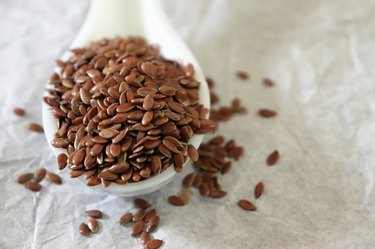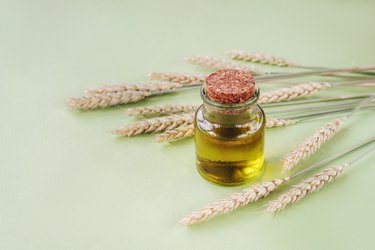
Growing old is a privilege, but how you treat your body throughout your life can influence how you feel in your golden years. Leading a healthy lifestyle plays a big part in aging gracefully, and that includes filling your diet with nutrient-dense foods.
Some factors are out of our control, such as genetics, but we do have control over what we eat, and a nutritious diet can support healthy aging in more ways than one, according to the National Institute on Aging.
Video of the Day
Video of the Day
"While we have yet to find the fountain of youth, there is research to suggest that the foods we put in our body may affect how quickly our organs and bodies and age," says Dana Ellis Hunnes, PhD, RD, senior clinical dietitian at UCLA medical center.
Eating more nutrients for longevity can be as simple as adding a single spoonful of flaxseed to your daily diet, for example.
Flaxseeds are a rich source of healthy fats and other beneficial nutrients, and it's recommended that older adults eat four to five servings of nuts and seeds per week, according to the USDA 2020-2025 Dietary Guidelines for Americans.
Here's how adding flaxseeds to your smoothies or sprinkling them on salads can support healthy aging.
Serving Size of Flaxseeds
The typical serving size of flaxseeds is 1 to 2 tablespoons, says Hunnes, noting that they should be eaten ground instead of whole.
Ground flaxseeds are easier on the digestive system and may provide more nutrients than whole flaxseeds, which can pass through your system undigested, according to the National Library of Medicine (NLM).
You can grind your flaxseeds at home or buy pre-ground flaxseeds typically sold as "flax meal."
3 Benefits of Flaxseeds for Healthy Aging
1. They Contain Nutrients Linked to Disease Prevention
The typical Western diet is high in fat, sodium, sugar and calories, and it raises the risk of obesity and chronic illnesses like type 2 diabetes, according to November 2020 research in Missouri Medicine. This type of diet is associated with highly-processed and fast foods that can cause inflammation and leave a lot of room for nutritional gaps.
"Highly-processed, nonnutritive foods cause inflammation in our bodies, which ages us much more quickly," Hunnes says. These foods cause oxidative stress in the body, which occurs when there is an excess of cell-damaging free radicals. T
here is a strong association between poor nutrition, oxidative stress and conditions like cancer, according to a July 2017 review in the International Journal of Molecular Sciences.
On the other hand, eating an antioxidant-rich diet has the opposite effect. Antioxidants neutralize free radicals and prevent them from damaging cells and increasing the risk of adverse health conditions, according to the National Cancer Institute.
Flaxseeds are especially rich in phytonutrients, lignans, tocopherols and ferulic acid, which all have antioxidant properties.
"These antioxidants lower the risk for chronic illnesses typically associated with aging, such as cancer, heart disease, stroke, diabetes and kidney disease," Hunnes says.
In particular, the lignans in flaxseeds have powerful antioxidant properties that have been tied to protection against diseases like cancer and heart disease. Flaxseeds contain up to 800 times more lignans than other plant foods, according to the Cleveland Clinic.
2. They're High in Omega-3s, Which Support Heart and Brain Health
Flaxseeds are high in omega-3 fatty acids, which are essential for healthy aging, according to the Harvard T.H. Chan School of Public Health.
There are three main types of omega-3 fatty acids: eicosapentaenoic acid (EPA), docosahexaenoic acid (DHA) and alpha-linolenic acid (ALA). Flaxseeds contain ALA, which can be converted into EPA and DHA.
The effects of ALA have been widely studied: It's been shown to have anticancer, anti-inflammatory and antioxidant properties, according to a January 2022 review in Phytotherapy Research.
"Omega-3s are beneficial for heart health and are anti-inflammatory, which is essential for healthy aging," Hunnes says. Those who eat a diet rich in omega-3 have a lower risk of heart disease, heart problems and heart-disease-related deaths, according to the Academy of Nutrition and Dietetics.
On top of all that, the lignans in flaxseeds have been tied to lowering cholesterol and blood pressure, per the American Heart Association.
Some preclinic research suggests that ALA may even scavenge free radicals and lower inflammation in the brain, according to the Alzheimer's Drug Discovery Foundation (ADDF).
In this way, ALA may help protect brain and nerve tissue, and researchers are studying it as a potential treatment for brain conditions like stroke and Alzheimer's dementia. More research is needed to determine the actual effects of ALA on the brain.
"Omega-3s, which are important in cellular-membrane structures, are also important for skin health and its ability to bounce back (aka skin elasticity)," Hunnes says. "So, eating flaxseeds is one way to support aging skin."
3. They Have Protein, Which Supports Muscle Health
One of the major threats to older adults is the loss of muscle mass, strength and function. Sarcopenia, or age-related muscle loss, happens when the muscles start to atrophy or waste away, leading to poor balance and weakness.
Muscle loss and lack of strength are directly associated with mortality in older people, according to a June 2016 review in Biogerontology.
Luckily, a combination of exercise and a muscle-supporting diet could help. Protein is a crucial nutrient for fighting the natural loss of muscle that occurs over time, according to a June 2016 review in Nutrients.
Older adults may require more protein in their diets to preserve and increase muscle mass. Flaxseeds consist of up to 30 percent protein, according to an April 2015 review in the Journal of Food Science and Technology.
Two tablespoons of ground flaxseeds has 2.6 grams of protein, or about 6 percent of your Daily Value (DV), according to the 2020-2025 Dietary Guidelines for Americans.
How to Use Flaxseeds
Flaxseeds have a mild and nutty flavor, so they're a pleasant addition to oatmeal, smoothies, cereal, parfaits, salads and so much more.
Here are some creative ways to incorporate flaxseeds into your daily diet:
- Oatmeal Breakfast Cookies: from the blog Feel Good Foodie
- Banana Almond Milk Smoothie: from the blog Real Food Whole Life
- Vegan Pumpkin Muffins: from Eating Bird Food blog
- Healthy Eggless Pancakes: from the blog Veggie Inspired
- Chia and Flaxseed Pudding: from the blogger Claudia Canu
- Protein Granola Breakfast Bowls: from the blog Dishing Out Health
- Energy Balls: from the blog Tastes Better From Scratch
- National Institute on Aging: "What Do We Know About Healthy Aging?"
- USDA: “2020-2025 Dietary Guidelines for Americans”
- National Library of Medicine: "Healthy food trends -- flaxseeds"
- My Food Data: “Flax Seeds”
- Missouri Medicine: "Obesity and the Western Diet: How We Got Here"
- International Journal of Molecular Sciences: "Correlation between Oxidative Stress, Nutrition, and Cancer Initiation"
- National Cancer Institute: "Antioxidants and Cancer Prevention"
- Cleveland Clinic: "Flaxseed: Little Seed, Big Benefits”
- Harvard T.H. Chan School of Public Health: "Omega-3 Fatty Acids: An Essential Contribution"
- Phytotherapy Research: "The review of alpha-linolenic acid: Sources, metabolism, and pharmacology"
- Academy of Nutrition and Dietetics: "What are Omega-3 Fatty Acids"
- American Heart Association: "Know the flax (and the chia): A little seed may be what your diet needs"
- Nutrients: "Protein Consumption and the Elderly: What Is the Optimal Level of Intake?"
- Journal of Food Science and Technology: "Flaxseed—a potential functional food source"
- Biogerontology: "Live strong and prosper: the importance of skeletal muscle strength for healthy ageing"
- Alzheimer's Drug Discovery Foundation: ALPHA LIPOIC ACID
- Feel Good Foodie: "Oatmeal Breakfast Cookies"
- Tastes Better From Scratch: "Energy Balls"
- Real Food Whole Life: "5-Minute Banana Almond Milk Smoothie"
- Eating Bird Food: "Vegan Pumpkin Muffins"
- Veggie Inspired: "Eggless Pancakes"
- Claudia Canu: "Chia and Flaxseed Pudding"
- Dishing Out Health: "Protein Granola Breakfast Bowls"




